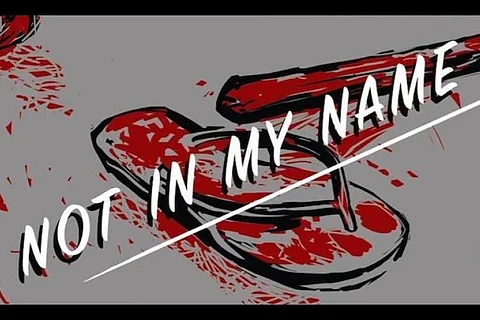

A Facebook post by filmmaker Saba Dewen against the lynching of a Muslim teenager on the Delhi-Mathura train has spawned an online campaign called #NotInMyName, leading to protests organised across the country. The protests will be held in Delhi, Kolkata, Hyderabad, Thiruvananthapuram and Bengaluru simultaneously on June 28.
No country for good liberals
While it is important to speak out against the regular violence that is perpetuated against Muslims and Dalits, it is also essential to understand the problematic nature of this campaign. #NotInMyName, by its very name and what it sets out to do, appears like Indian upper-caste liberals’ version of #NotAllMen.
The #NotAllMen campaign allows men to take the focus away from structural gender inequality and the role they play in preserving it. Instead, it forces everyone to engage in the fact that not all men are bad and that there are some nice men too. Similarly, the #NotInMyName campaign takes the focus away from Brahmanism, which is at the core of the Hindu religion, and its scriptures that sanction social inequality and allow for violence to preserve its unequal structure. But the campaign makes great effort to tell us how upper caste liberals are nice, progressive people who have nothing to do with the violence.
Instead of speaking against the structural oppression and violence, both these campaigns allow self-righteous individuals to give themselves a clean chit. Taking the attention away from why (and by whom) violence is repeatedly perpetuated on certain oppressed and marginalized groups; these campaigns only reveal how squeaky-clean liberals’ hands are. While liberals seem to easily understand how an argument like #NotAllMen works, it is strange that they don’t see the problem in claiming #NotInMyName.
Dial B for Brahmanism
Also, the campaign makes one wonder what it seeks to protest against. Is it against those specific individuals who participated in the acts of violence? Or is it against the several Hindu groups, which seem emboldened since the BJP came to power at the centre? Or is it against the ruling BJP government itself? Or is it against Brahmanism and the Hindu religion, which allow for violence to preserve social inequality?
Because it is certainly surprising to see how several of those who have joined this campaign claim, “I am a Hindu. But I am against the lynching of Muslims and Dalits. #NotInMyName” or “Save Hinduism from Hindutva! #NotInMyName”. By creating an imaginary and false difference between ‘Hinduism’ and ‘Hindutva’, upper caste liberals have conveniently compartmentalized the Hindu religion and the violence it sanctions. But in reality, both Hinduism and Hindutva set out to uphold Brahmanical supremacy and therefore can only mean the same.
However, this convenient compartmentalization has allowed upper caste liberals to preserve and benefit from the Brahmanical structure, but at the same time speak against the violence it perpetuates. Such campaigns can be win-win situations for these liberals but they serve no real use for those oppressed by the structure.
Whose name is it anyway?
This is not the first time such empty campaigns have gained currency in liberal spaces. Earlier, when Mohammad Akhlaq was lynched based on a rumor that his family had consumed beef, liberals protested against it by instagramming images of beef dishes and sharing chilly beef recipes. Fully aware of their privileged caste location and knowing that these ‘acts of protests’ would not put them in any danger, they repeatedly indulged in it.
However, there was absolutely no attempt made to introspect or understand how these food-policing rules and the subsequent acts of violence stem from the Brahmanical Hindu religion. This is because any such introspection would involve questioning one’s own location within the Brahmanical Hindu fold and how it provides them with privileges and protection. Dismantling the Brahmanical Hindu structure would mean that upper caste liberals might have to lose their privileges and be reduced to a disadvantaged position compared to now.
Instead of directing their noble intentions and rage outwardly and thereby disassociating themselves from these acts of violence, upper caste liberals should instead look inward and see if they can bring about any change. If we intend to speak against the violence that is inflicted on Muslims and Dalits in this country, we should first learn to utter the word ‘Brahmanism’. Shying away from the root cause and merely speaking about the symptoms is a pointless act.
Note: Views expressed are the author's own.